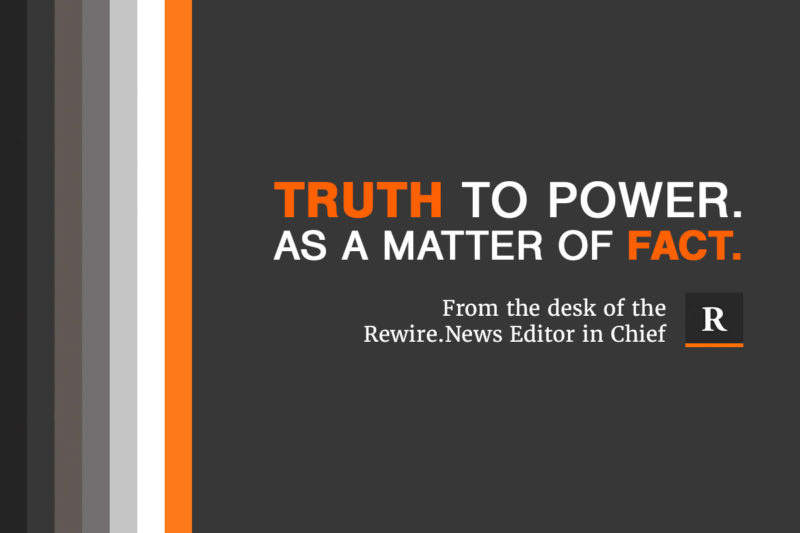Our Denial of Racism Is the Real Political Correctness
The GOP is only too happy to rail against "political correctness." But the real political correctness is failing to speak out about and contend with white supremacy, and the GOP—and too often the media—contribute to this failure every day.

The GOP and its followers are fond of stoking anger about “political correctness,” which they pretty much define as any statement or policy supporting the basic humanity and exercise of basic human rights by women, people of color, LGBTQ communities, persons with disabilities, immigrants, and those who participate in non-Christian religious observance. In other words, if you argue in favor of removing barriers to anyone who is not a white male, you are likely facing charges of “political correctness.” Donald Trump ran a campaign based on legitimizing dangerous stereotypes aimed at virtually everyone who is not white and male, under the banner of rejecting political correctness.
The real political correctness in our society, however, is our abject failure to call a racist a racist; to unequivocally confront the explicit and implicit racism of the Republican party; and to find every excuse in the book not to call out racism when it’s staring us right in the face. Instead, we spend time agonizing over racist statements and policies by wondering whether we can “really know” what is in someone’s heart or mind. What is in someone’s heart or mind is irrelevant, however—or if you prefer, what’s in their heart and mind is blatantly obvious—if they repeatedly engage in and promote racist stereotypes or promote laws and policies with racist outcomes. The real political correctness is our unwillingness or inability to call out the default white supremacy on which our country operates. And never has that been made clearer than by the hand-wringing that continues as to whether Trump is a racist, even a day after he branded a broad swath of the planet as “shithole” countries.
Trump has been making his profoundly racist views very clear for decades; the New York Times’ David Leonhardt lists a number of the many instances of racist business of and statements made by Trump from the 1970s onward. Throughout his campaign and into his presidency, Trump not only made openly racist statements, but created a racist cabinet, and has either put in place or attempted to pursue any number of racist policies, such as abruptly ending Temporary Protected Status for immigrants from El Salvador, Haiti, Nicaragua, and Sudan and precipitously ending DACA. And he’s done so with the eager help of Attorney General Jeff Sessions, Kansas Secretary of State Kris Kobach, Vice President Mike Pence, senior adviser Stephen Miller, General John Kelly, and many others now serving in this administration.
Yet few Republican members of the House or Senate have spoken up to condemn the president or call out his racism even in light of the uncontrovertibly racist “shithole” comments. New York magazine made a detailed list of responses from the GOP one day out, in which Reps. Carlos Curbelo (R-FL), Ileana Ros-Lehtinen (R-FL), Mia Love (R-UT), and Sens. Marco Rubio (R-FL) and Jeff Flake (R-AZ) bemoaned the comments but did not call out Trump’s racism explicitly. Sen. Orrin Hatch (R-UT) asked for an explanation for Trump’s comments (what Hatch doesn’t understand about blatant racism is not clear to me). Speaker of the House Paul Ryan barely managed to call Trump’s comments “very unfortunate” and “unhelpful.” Condemning racism? Nope.
In fact, some are actually supporting or defending Trump. Rep. Lee Zeldin (R-NY) suggested that Trump was just being his usual politically incorrect self.
Pres @realDonaldTrump wasn't elected for his ability or willingness to be politically correct. The fact is that there are many nations in the world struggling mightily… politically & economically, w poor infrastructure, schools, physical security & more.
— Lee Zeldin (@leezeldin) January 12, 2018
Fox News hosts Tucker Carlson and Jesse Watters, perhaps predictably, defended Trump’s statements because, you know, he was right.
Even the New York Times referred in its reporting to Trump’s comments as “racially tinged.” If these comments were just “racially tinged,” I am afraid to see what full-color racism looks like.
What underlies all of this is the reality that the political norm in the United States is white supremacy, which is deeply and profoundly embedded in our culture and which Donald Trump and his supporters in Congress and in the public are desperate to protect. I don’t need to ask what was in the heart or the mind of Hitler, Mussolini, Pol Pot, or others who led their people into genocide or ethnic cleansing. And I don’t need to know what (if anything) is in Donald Trump’s heart or mind because both his actions and his words tell us who he is.
Dithering by politicians, media outlets, pundits, and reporters about what is or what is not racist enabled and spurred Trump on through his campaign and into the White House, because it was all labeled an attack on “political correctness.”
The real political correctness is failing to speak out about and contend with white supremacy, and the GOP—and too often the media—is only too eager to comply in failing to strongly confront racism.
